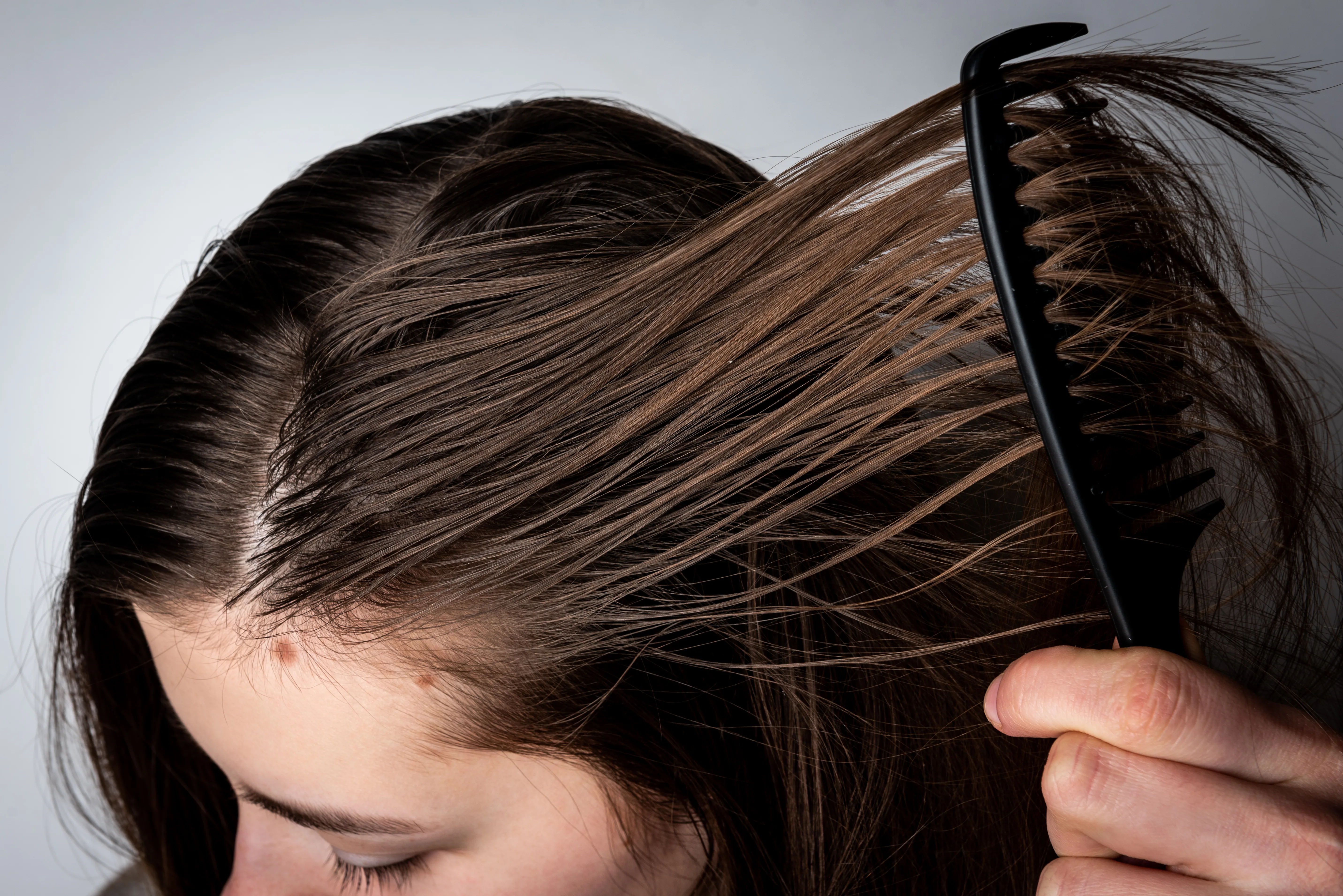CAUSES OF GREASY HAIR
There are various reasons for a greasy hair. But which one is relevant for you?

Everyone has found themselves with greasy hair and greasy scalps at some point in time, wondering why life has been so cruel to them. You might have had an important meeting or a special date or simply wanted to feel nice for that day. But greasy hair can ruin that for you.
What is this ‘grease’?
It can almost feel like you’re a mechanic working with machine grease, but this greasiness is basically your hair being oily. Your scalp and face are covered with a large number of sebaceous glands, which secrete a waxy oil-like substance known as sebum. It is meant to lubricate and protect your head from the outside world. It binds together the outer layer of your hair strand and prevents moisture loss that can lead to frizzy hair.This sebum is supposed to flow naturally from your scalp down to the tips of your hair, coating the entire strand. It is vital in the proper functioning of your hair ecosystem. But sometimes your scalp can start producing more sebum than you require, or maybe the existing sebum has not been cleaned out. In these situations, the sebum or oil builds up on your hair strand and weighs it down. Add dirt, grime, and sweat to this, and you end up with greasy hair.
Is there any connection to dandruff?
One of the main reasons for dandruff is an excessively greasy scalp.
If there is a build-up of sebum on your scalp, it provides ideal feeding ground for a fungus known as Malassezia Globosa. This naturally occurring fungus can break down the sebum into fatty acids that almost 3 billion people across the world react to. If you are one of those people, your body will react in the form of redness, scalp itching, and white-yellow oily flakes of dead skin cells. This is why an oily scalp and dandruff go hand in hand.
What is the cause of greasy hair?
There are a multitude of reasons for having a greasy head of hair, and most of them have to do with how you take care of yourself. Understanding this can help you find the quickest solution before that greasy hair causes you any more trouble.
-
Over-washing
Seems hard to believe, but this is the most common reason for oily hair. When you shampoo your hair too often, it can strip away the natural oils that are meant to protect you. This triggers your scalp into producing more oil to compensate. To get rid of this additional oil, you’ll wash even more, and an endless cycle of oily hair is created. -
Hormonal fluctuations
The amount of oil secreted by sebaceous glands is influenced by the sex hormones in each individual. They affect different people in different ways and fluctuations in your testosterone, oestrogen, or progesterone levels can directly impact your sebaceous secretions. This can increase the levels of sebum on your scalp and hair, even leading to greasy dandruff. -
Touching your hair too often
It’s a nervous tick for some and a habit for others, but your hands are not necessarily clean. When you touch your hair, you invariably transfer oils and germs from your hand onto your hair strands. This creates an unhealthy environment on your hair and also increases the risk of scalp infections. -
Poor hair care
We spoke about over-washing, but under-washing your hair is also a problem. If you don’t shampoo your hair regularly, it can lead to a build-up of oils on your hair and scalp. You need to use the right shampoo for oily scalp, 2-3 times a week. -
Unclean brush and pillowcase
When you leave your brush lying around and don’t wash it regularly, it can accumulate dirt, old product, and bacteria. This gets transferred onto your hair, causing a disruption in your oil levels and hair health. Same thing happens with pillowcases that are not washed frequently. You’re just transferring all the grime onto your head. -
Over-conditioning
The excessive use of conditioners can start to layer on your hair and lend to the greasy look. Many conditioners have heavy chemicals that are used for deep conditioning. If you use them too often, they stop serving their original purpose and weigh down your hair. You should also avoid applying it directly onto your scalp. -
Weather changes
If you go from cold temperatures straight in for a hot shower, or vice versa, it sends mixed signals to your scalp. These sudden changes can trigger your body into producing more oil as a defence mechanism. Even humidity and sweat can play a role in increasing body temperature and cause your sebaceous glands to increase oil production. -
Stress and Diet
When you’re stressed, your body releases the hormone cortisol. This helps you deal with the tension of the moment, but it can also escalate your sebum production. If you add a poor diet to this, it’s a perfect recipe for an oily head. Excessive intake of carbs, fats, refined sugars, dairy products, and red meat can cause your sebum levels to spike.
Greasy hair causes a lot of anguish, especially if you can’t find an immediate solution. It’s even worse if you end up with dandruff. There are various routes out of this, but the simplest is to use an oily scalp dandruff shampoo. Try and see what products might work for you. If you want a dandruff shampoo that revitalises your scalp and leaves you free of dandruff, you can look at the Head and Shoulders Cool Menthol. Just find the reason behind your greasy hair, a solution will be waiting for you around the corner.



